Cognitive processes in infection brain damage
DOI:
https://doi.org/10.25057/21452776.1209Keywords:
Evaluation, Cognitive Processes, Brain Infection, Cerebral Damage, Cognitive ImpairmentAbstract
Cognitive processes let thinking about intellectual human abilities, interacting body-mind, and/or environment- mind, to understand the world from reciprocal and constant perception, speech, making decisions, memory, and emotions. But human fragility make us susceptible to suffer, both the normal aging impairment and caused by viral, bacterial, parasitic and fungal agents that alter such processes. Objective: To know the characteristics of cognitive processes assessment when there is brain damage or deterioration by infection. Methodology: Descriptive review trough data bases like EBSCO, NATURE – International Weekly Journal of Science-, OXFORD academic, PsycARTICLES American Psychological Asociation, Science Direct (Journals), SCOPUS, Google Scholar, Redalyc.Org, y Scielo for information after to 2014. Results: Was found it that while different pathogens can alter de cellular estructure of the brain, and consequently their cognitive processes, this have a high sensibility to inflammation caused by virus; but nevertheless, there is no much known about how much cognitive function could be impaired and its response to common and aparently innocuous viral infection. Conclusions: It becomes important to be able to discern the care of different cognitive functions, both from healthy style life or primary prevention and from computarized technology using that allows the optimization of neuropsychological assessment for cognitive functions.
Author Biography
Juan Carlos Ortiz Valencia, Investigador independiente
Psicólogo UNAD, Esp. Adicciones Universidad Católica Luis Amigó, Maestría en Neuropsicología, Universidad de San Buenaventura, Colombia, jortiz_valencia@hotmail.com. Investigador independiente
References
Ackermann, C., van Toorn, R., Andronikou, S. (2019). Human immunodeficiency virus-related cerebral white matter disease in children. Pediatric Radiology, 49(5), 652–662. https://doi.org/10.1007/s00247-018-4310-x
Aguado, L. (2002). Procesos cognitivos y sistemas cerebrales de la emoción. Revista de Neurologia, 34(12), 1161–1170.
Cabello, J. B. (2003). Programa de habilidades en lectura crítica CASPe. Entendiendo la evidencia sobre la eficacia clínica. In CASPe. Guías CASPe de Lectura Crítica de la Literatura Médica. (p. 5). Alicante. Retrieved from http://www.redcaspe.org
Carmilema T, J. C., Fajardo B, M. F. (2018). Evaluación sobre los niveles de atención y memoria en pacientes drogodependientes en condición de internamiento. Universidad de Cuenca. https://doi.org/10.22201/fq.18708404e.2004.3.66178
Chimbo Ch, E. W. (2014). La drogodependencia y su influencia en la capacidad para la toma de decisiones. Universidad Central Del Ecuador. Universidad Central del Ecuador.
Cohen, S., Ter Stege, J. A., Geurtsen, G. J., Scherpbier, H. J., Kuijpers, T. W., Reiss, P., … Pajkrt, D. (2015). Poorer cognitive performance in perinatally HIV-infected children versus healthy socioeconomically matched controls. Clinical Infectious Diseases, 60(7), 1111–1119. https://doi.org/10.1093/cid/ciu1144
Fan, C. K., Holland, C. V., Loxton, K., Barghouth, U. (2015). Cerebral toxocariasis: Silent progression to neurodegenerative disorders? Clinical Microbiology Reviews, 28(3), 663–686. https://doi.org/10.1128/CMR.00106-14
Fernández, G., Orozco, D., Agamennoni, O. (s.f.). Evaluación Cognitiva mediante Eye tracking ( ECEt ). Buenos Aires, Argentina: Universidad Nacional del Sur. http://www.gmics.diec.uns.edu.ar/images/PDFs/EvaluacinCognitivaMedianteEyetrackingFolletoMedico.pdf
Ferrari, J., Campos, G., Kalil, J., Nitrini, R., Jacob-Filho, W., Tesseroli, J., D.T.Siqueira, S. (2016). Oral Infections and Cytokine Levels in Patients with Alzheimer’s Disease and Mild Cognitive Impairment Compared with Controls. Journal of Alzheimer’s Disease, 52(4), 1479–1485. https://doi.org/10.3233/JAD-160212
Flores, J., Ostrosky-Solís, F., Lozano, A. (2008). Batería de Funciones Frontales y Ejecutivas: presentacion. Revista de Neuropsicología, neuropsiquaiatría y neurociencias, 8 (1), 141-158, https://aalfredoardila.files.wordpress.com/2013/07/ardila-a-ed-2008-funciones-ejecutivas-neuropsicologia-neuropsiquiatria-y-neurociencias-vol-8-n1.pdf
Gajewski, P. D., Falkenstein, M., Hengstler, J. G., Golka, K. (2014). Toxoplasma gondii impairs memory in infected seniors. Brain, Behavior, and Immunity, 36, 193–199. https://doi.org/10.1016/j.bbi.2013.11.019
García-Herranz, S., Díaz-Mardomingo, M., Peraita, H. (2014). Evaluación y seguimiento del envejecimiento sano y con deterioro cognitivo leve (DCL) a través del TAVEC. Anales de Psicología, 30(1), 373–380. https://doi.org/10.6018/analesps.30.1.150711
Gicas, K. M., Vila-Rodriguez, F., Paquet, K., Barr, A. M., Procyshyn, R. M.,
Lang, D. J., … Thornton, A. E. (2014). Neurocognitive profiles of marginally housed persons with comorbid substance dependence, viral infection, and psychiatric illness. Journal of Clinical and Experimental Neuropsychology, 36(10), 1009–1022. https://doi.org/10.1080/13803395.2014.963519
Golub, M. D., Chase, S. M., Batista, A. P., Yu, B. M. (2016). Brain-computer interfaces for dissecting cognitive processes underlying sensorimotor control. Current Opinion in Neurobiology, 37, 53–58. https://doi.org/10.1016/j.conb.2015.12.005
Guzmán de R, C. (2013). Evaluación Neuropsicológica de los Procesos Cognitivos en la Epilepsia. Red de Revistas Científicas de América Latina y El Caribe, España y Portugal, 11(2), 193–227. Retrieved from http://www.redalyc.org/html/4615/461545460005/
Hagler, S., Brugge, H., Pavel, M. (2014). Assessing executive function using a computer game: computational modeling of cognitive processes. IEEE Journal of Biomedical and Health Informatics, 18(4), 1442–1452. https://doi.org/10.1109/JBHI.2014.2299793
Hamdani, N., Daban-Huard, C., Lajnef, M., Gadel, R., Le Corvoisier, P.,
Delavest, M., … Leboyer, M. (2015). Cognitive deterioration among bipolar disorder patients infected by Toxoplasma gondii is correlated to interleukin 6 levels. Journal of Affective Disorders, 179, 161–166. https://doi.org/10.1016/j.jad.2015.03.038
Hung, T. H., Chen, V. C. H., Yang, Y. H., Tsai, C. S., Lu, M. L., McIntyre, R. S., … Huang, K. Y. (2018). Association between enterovirus infection and speech and language impairments: A nationwide population-based study. Research in Developmental Disabilities, 77, 76–86. https://doi.org/10.1016/j.ridd.2018.04.017
Introzzi, I., Canet-Juric, L., Montes, S., López, S., Mascarello, G. (2015). Procesos Inhibitorios y flexibilidad cognitiva : evidencia a favor de la Teoría de la Inercia Atencional. International Journal of Psychology Research, 8(2), 61–75. http://www.scielo.org.co/pdf/ijpr/v8n2/v8n2a06.pdf
John, C. C., Carabin, H., Montano, S. M., Bangirana, P., Zunt, J. R., Peterson, P. K. (2015). Global research priorities for infections that affect the nervous system. Nature, 527(7578):S178-86. doi: 10.1038/nature16033.
Karachaliou, M., Chatzi, L., Roumeliotaki, T., Kampouri, M., Kyriklaki, A., Koutra, K., … de Sanjose, S. (2016). Common infections with polyomaviruses and herpesviruses and neuropsychological development at 4 years of age, the Rhea birth cohort in Crete, Greece. Journal of Child Psychology and Psychiatry and Allied Disciplines, 57(11), 1268–1276. https://doi.org/10.1111/jcpp.12582
Lattanzi, S., Luzzi, S., Provinciali, L., Silvestrini, M. (2014). Blood pressure variability predicts cognitive decline in Alzheimer’s disease patients. Neurobiology of Aging, 35(10), 2282–2287. https://doi.org/10.1016/j.neurobiolaging.2014.04.023
Licastro, F., Raschi, E., Carbone, I., Porcellini, E., Caruso, C. (2015). Variants in antiviral genes are risk factors for cognitive decline and dementia. Journal of Alzheimer’s Disease, 46(3), 655–663. https://doi.org/10.3233/JAD-142718
Llinás, R. (2003). El cerebro y el mito del Yo. El papel de las neuronas en el pensamiento y el comportamiento humanos. Bogotá, Colombia: Editorial Norma.
Luna-Lario, P., Azcárate-Jiménez, L., Seijas-Gómez, R., Tirapu-Ustárroz, J. (2015). Propuesta de una batería neuropsicológica de evaluación cognitiva para detectar y discriminar deterioro cognitivo leve y demencias. Revista de Neurologia, 60(12), 553–561. Retrieved from http://www.ncbi.nlm.nih.gov/pubmed/26062828
Macbeth, G., Cortada, N., Razumiejeczyk, E., López, A. (2008). Eficacia del monitoreo metacognitivo en procesos de atribución de verdad, falsedad y novedad. Signos Universitarios. 27(43), 63-76, Retrieved from http://p3.usal.edu.ar/index.php/signos/article/view/2163/2710
Mariángel, S. V., Jiménez, J. E. (2015). Desarrollo de la conciencia sintáctica y fonológica en niños chilenos: un estudio transversal. Revista Latinoamericana de Psicología, 48(1), 1–7. https://doi.org/10.1016/j.rlp.2015.09.010
Marino, J., Jaldo, R., Arias, J., Palma, M. (2017). Neurociencia de las capacidades y los procesos cognitivos. Buenos Aires: Editoral brujas.
Marmor, M., Glickman, L., Shofer, F., Faich, L. A., Rosenberg, C., Cornblatt, B., Friedman, S. (1987). Toxocara canis infection of children: Epidemiologic and neuropsychologic findings. American Journal of Public Health, 77(5), 554–559. https://doi.org/10.2105/AJPH.77.5.554
Megías, M., Esteban, L., Roldán, M. D., Estévez, Á., Sanchez-Joya, M., Ramos-Lizana, J. (2015). Evaluación neuropsicológica de procesos cognitivos en niños de siete años de edad nacidos pretérmino. Anales de Psicologia, 31(3), 1052–1061. http://dx.doi.org/10.6018/analesps.32.1.151881
Mias, C. D., Bastida, M. F., Del Boca, M. L., Legeren, A. L. (2017). Edades críticas en el declive de distintas funciones neurocognitivas en adultos jóvenes y mayores. Anuario de Investigaciones, 3(2), 182–190. https://revistas.unc.edu.ar/index.php/aifp/article/view/18829
Moreno, C., Castelblanco, I., Peña, K., Sandoval, M., Zamudio, J., Prieto, A. (2016). Efectos fisiológicos de Cannabis Sativa en universitarios consumidores. (R. Carvajalino, N. De la Cuadra, M. Jaramillo, M. de Olivos, Eds.) (Primera). Bogotá, Colombia: Editorial UD.
Nelson, S., Greene, T., Ernhart, C. B. (1996). Toxocara canis infection in preschool age children: Risk factors and the cognitive development of preschool children. Neurotoxicology and Teratology, 18(2), 167–174. https://doi.org/10.1016/0892-0362(95)02018-7
Nimgaonkar, V., Yolken, R., Wang, T., Chung-Chou, H., McClain, L.,
McDade, E., … Ganguli, M. (2016). Temporal cognitive decline associated with exposure to infectious agents in a population-based, aging cohort. Alzheimer Disease and Associated Disorders, 00(0), 216–222. Retrieved from http://www.ncbi.nlm.nih.gov/pmc/articles/PMC4919236/
Ollari, J. (1999). Declinación cognitiva y deterioro cognitivo. Envejecimiento normal y enfermedades de la senescencia. Rev Neurol Arg, 23(1), 3-8, http://www.imbiomed.com.mx/1/1/articulos.php?method=showDetail&id_articulo=16089&id_seccion=1316&id_ejemplar=1666&id_revista=95
Portellano, J. A. (2005). Introducción a la neuropsicología. (J. M. Cejudo, Ed.), Mc Graw Hill. Madrid, España: Mc Graw-Hill.
Ragin, A. B., Wu, Y., Gao, Y., Keating, S., Du, H., Sammet, C., … Epstein, L. G. (2015). Brain alterations within the first 100 days of HIV infection. Annals of Clinical and Translational Neurology, 2(1), 12–21. https://doi.org/10.1002/acn3.136
Ravindran, O. S., Rani, M., Priya, G. (2014). Cognitive deficits in HIV infected children. Indian Journal of Psychological Medicine, 36(3), 255. https://doi.org/10.4103/0253-7176.135373
Rivas N, M. (2008). Procesos cognitivos y aprendizaje significativo. Madrid, España: Subdirección General de Inspección Educativa de la Viceconsejería de Organización Educativa de la Comunidad de Madrid, http://www.deposoft.com.ar/repo/publicaciones/A9R6652.pdf
Rojo-Mota, G., Pedrero-Perez, E., Ruiz-Sánchez, J., Llanero-Luque, M.,
Puerta-Garcia, C. (2013). Cribado neurocognitivo en adictos a sustancias: la evaluación cognitiva de Montreal. Revista de Neurologia, 56(3), 129–136. Retrieved from http://www.neurologia.com/pdf/Web/5603/bh030129.pdf%5Cnhttp://ovidsp.ovid.com/ovidweb.cgi?T=JS&PAGE=reference&D=emed11&NEWS=N&AN=2013107433
Sandoz, M., Démonet, J. F., Fossard, M. (2014). Theory of mind and cognitive processes in aging and Alzheimer type dementia: A systematic review. Aging and Mental Health, 18(7), 815–827. https://doi.org/10.1080/13607863.2014.899974
Silveira, C. (2016). The effects of physical exercise on cognition of individuals with Parkinson’s disease. Doctoral thesis, University Of Waterloo, https://pdfs.semanticscholar.org/43f2/599a72fa1590fd24e30b2ba77a18160a7c2a.pdf
Solís-Marcos, I., Castellano-Guerrero, A., Domínguez Morales, R., León-
Carrión, J. (2019). Predictores de la recuperación funcional cognitiva en pacientes con traumatismo craneoencefálico. Revista de Neurología, 58(07), 296–302. https://doi.org/10.33588/rn.5807.2013514
Spagnolo, F., Scomazzoni, F., Fichera, M., Comi, G., Volontè, M. A. (2014). Secondary cervical dystonic tremor after Japanese encephalitis. Neurological Sciences, 35, 491–493. https://doi.org/10.1007/s10072-013-1579-2
Su, T., Caan, M. W. A., Wit, F. W. N. M., Schouten, J., Geurtsen, G. J., Cole, J. H., … Majoie, C. B. (2016). White matter structure alterations in HIV-1-infected men with sustained suppression of viraemia on treatment. Aids, 30(2), 311–322. https://doi.org/10.1097/QAD.0000000000000945
Takeda, S., Sato, N., Morishita, R. (2014). Systemic inflammation, blood-brain barrier vulnerability and cognitive / non-cognitive symptoms in Alzheimer disease: Relevance to pathogenesis and therapy. Frontiers in Aging Neuroscience, 6, 1–8. https://doi.org/10.3389/fnagi.2014.00171
Vergel C, R. (2014). El signo en Vygotski y su vínculo con el desarrollo de los procesos psicológicos superiores. Folios, (39), 65–76. https://doi.org/10.17227/01234870.39folios65.76
Vieira, V., Marques, F., Rizzo, A. (2015). Learning Difficulties in Computing Courses : Cognitive Processes Assessment Methods Research and Application. XI Brazilian Symposium on Information System, 31–38. https://doi.org/10.13140/RG.2.1.4560.1768
Villalba, S., Tortajada, R. (2014). Estimulación cognitiva: una revisión neuropsicológica. Therapeía 6, (6), 73–93. http://gamisolution.es/wp-content/uploads/2016/06/Dialnet-EstimulacionCognitivaUnaRevisionNeuropsicologica-5149523.pdf
Widmann, C. N., Heneka, M. T. (2014). Long-term cerebral consequences of sepsis. The Lancet Neurology, 13, 630–636. https://doi.org/10.1016/S1474-4422(14)70017-1
Wu, Y. H., Cui, X. Y., Yang, W., Fan, D. Y., Liu, D., Wang, P. G., An, J. (2018). Zika Virus Infection in Hypothalamus Causes Hormone Deficiencies and Leads to Irreversible Growth Delay and Memory Impairment in Mice. Cell Reports, 25(4), 1537–1547. https://doi.org/10.1016/j.celrep.2018.10.025
Zhao, L., Zhou, M., Wang, B., Guo, J., Chen, N., He, L. (2015). Clinical characteristics and outcome of clinically diagnosed viral encephalitis in southwest China. Neurological Sciences, 36, 2191–2197. https://doi.org/10.1007/s10072-015-2333-8
How to Cite
Downloads
Languages:
esDownloads
Published
Issue
Section
License
Copyright (c) 2019 Institución Universitaria de Envigado

This work is licensed under a Creative Commons Attribution-NonCommercial-ShareAlike 4.0 International License.

| Article metrics | |
|---|---|
| Abstract views | |
| Galley vies | |
| PDF Views | |
| HTML views | |
| Other views | |




